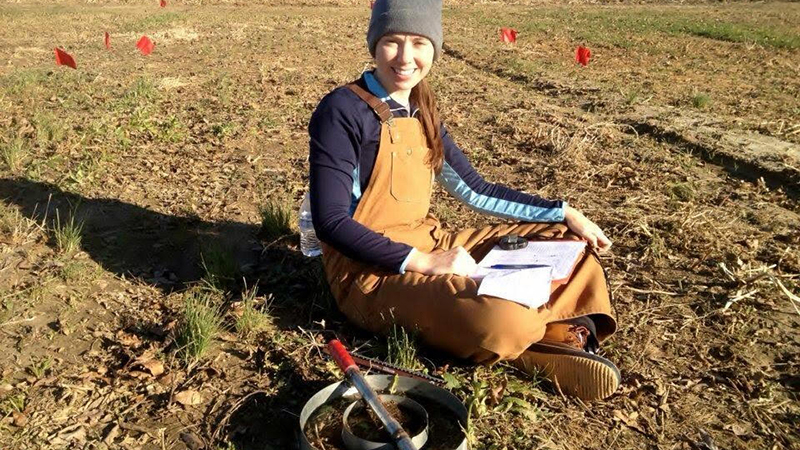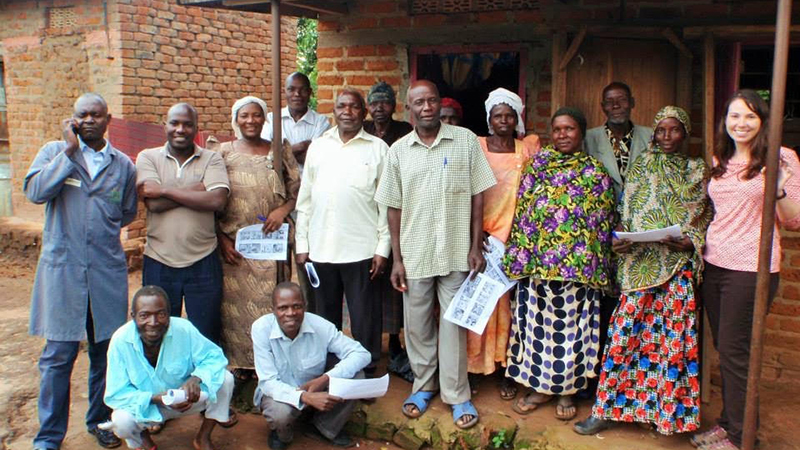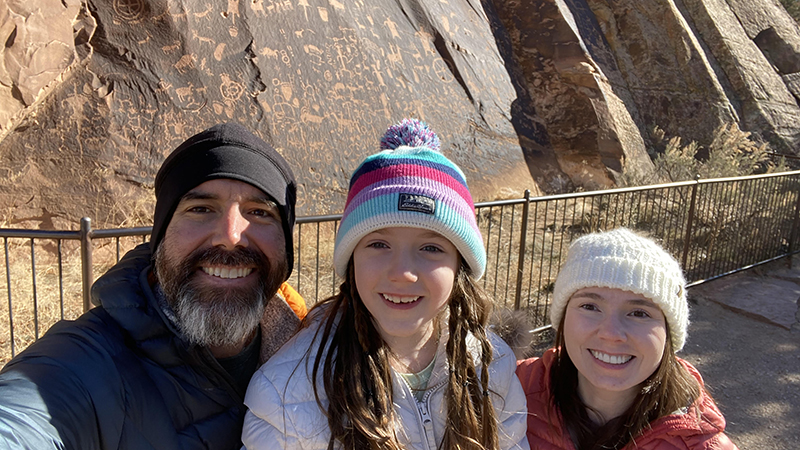My Story
Hi, I am Jill Motschenbacher, an associate professor of practice in soil conservation within the School of Natural Resources.
I am a soil scientist with a background in soil physics, agroecology, sustainable cropping systems, biosystems and electrical engineering, international agriculture, agriculture economics, higher education administration, and learner-focused teaching. Using the overlapping skillsets of my background, I focus my academic research, teaching, and practice on identifying, and understanding, barriers to sustainable agriculture production systems – from land preparation to product consumption – at different scales and contexts. I examine whole agriculture production systems – inputs, processes, and outputs – in efforts to uncover underlying ecological, physical, and social barriers that may be prevent optimal system performance.
 Measuring soil water infiltration with a double-ring infiltrometer in a wheat-soybean rotation under different field treatments. Marianna, Arkansas. Nov. 2012
Measuring soil water infiltration with a double-ring infiltrometer in a wheat-soybean rotation under different field treatments. Marianna, Arkansas. Nov. 2012
I am interested in the scientific dynamics of agroecosystems and understanding the ‘what, why, and how’ past chronological events influence modern agriculture system. I believe that evaluating the deeper origins of agricultural system histories can better help us understand and problem-solve persistent issues plaguing modern food and fiber production. Comprehension of how specific agriculture systems evolved, including aspects of supply and demand, preference, generational knowledge, civil ordinances, and social influences, helps clarify root causes of obstacles that impact long-term system resiliency, natural resource use, and associated human experiences.
At UNL, I teach and mentor graduate students, at both the masters (MAS, MS) and doctoral levels (PhD, DPH), in understanding how their specialized scientific knowledge can influence societal implications, as well as how historical and social dynamics impact agriculture system resilience. I have developed three graduate classes which cover advanced systems-based examinations of conservation agriculture, resilience design, and international agriculture. These classes aim to guide students in developing their unique scholarly identity and learn how to apply knowledge to create system- and community-based improvement plans. Together, the three classes help form the core graduate course offerings for the UNL's Master of Applied Sciences (MAS) program in the Conservation Agriculture specialization.
My Path to UNL
The path that led me to embrace academia as my professional home has been both a journey and an adventure, but uniformly centers on my innate drive to understand the ‘how’ and ‘why’ of life. In general, I have a lot of questions. I have always been curious about ‘how’ things work and ‘why’ people do what they do. Like most aspects of life, answers to these questions are more complicated than a single answer – there is always a deeper story. Discovering ‘the deeper story’ often takes a trio of time, persistence, and patience. Luckily, life has given me time, persistence is a skill I began developing at an early age, and I eventually learned to be patient. Using this ‘magical’ trio has allowed me to push through barriers in my path and gain knowledge, build character, understand myself, and focus on what I find is most important aspects of life.
Life experiences can be discussed and categorized in many ways, and these categories can vary depending on the individual. For me, I use five distinct categories of life experiences to ponder perspectives and brainstorm ideas related to agriculture, the environment, and society, which include my childhood, military service, travels, university studies/student-life, and parenthood/family-life. Together, these categories vastly differ across time, location, cultures, and societal expectations, but the experiences also build off of each other in a way that offers me the ability to understand and mitigate conflicting perspectives, which sometimes clash in modern society. Conflicting perspectives, in any communal situation, can lead to social strongholds that hinder innovation and stifles progress. In agricultural communities, limiting progress takes time away from developing resilient agricultural systems and food-secure communities into the future. This middle ground is where I gain my motivation to teach, research, and bring diverse groups of people together to continue progress in service to humanity and Earth.
I was born and raised in Smyrna, Tennessee, which is where my immediate family still resides. Yet, over the past 25+ years, I have moved and lived in seven different states across the United States, aboard a ship – USS Sacramento (AOE-1), and in a transient, semi-nomadic/adventure-traveler lifestyle for extended periods across the globe. Overall, I have moved for work and school more times than I can count, and my travels have led me to explore batches of countries across the continents of North America, Asia, Australia, Africa, and Europe. I continue to add to the list whenever an opportunity becomes available.
 Small-holder maize farmers associated with the Namungalwe Area Cooperative Enterprise. Iganga, Uganda. Apr. 2014.
Small-holder maize farmers associated with the Namungalwe Area Cooperative Enterprise. Iganga, Uganda. Apr. 2014.
My path led me to UNL, so I now reside in Lincoln, Nebraska with my spouse, best friend, and fellow soil enthusiast, Aaron, and our daughter, Ruby, who has an optimistic spirit in life and loves creatures, big and small. Our family includes two loving rescue cats (Agate and Basalt) who have lofty expectations and are happy to inform us if we are failing to meet these performance levels in any way. As a family, we intentionally spend time every day enjoying the small moments in life together. Our free time is filled with travel adventures, cultural events, enjoying a diversity of cuisines, and participating in kid-friendly activities in our neighborhood and the community. We live a low-key, but adventurous, lifestyle, and I appreciate every moment.
 My family (Aaron, Ruby, and me) in front of the Newspaper Rock petroglyphs during one of our family hiking trips. Monticello, Utah. Dec. 2021.
My family (Aaron, Ruby, and me) in front of the Newspaper Rock petroglyphs during one of our family hiking trips. Monticello, Utah. Dec. 2021.
Research and Teaching
I research and teach about the intricate connections between agroecosystem management practices, food system performance, biogeochemical cycling, global change, and societal responses to production modifications. I enjoy investigating obstacles that require multi-discipline approaches to solution development, such as ecological conservation, resource accessibility, soil and water management, transportation logistics, knowledge exchange and utility, and the identification of economic practices and social customs that influence food consumption patterns and food sovereignty.
My approach towards teaching and learning, and researching about teaching and learning processes, pivots on advancing scientific knowledge and growing conceptual understanding of agriculture systems. I aim to empower students, practitioners, researchers, and stakeholders on ways to develop tangible connections between the environment, food systems, land management, experienced technical skillsets, and new knowledge to create justifiable plans to implement solutions on emerging agricultural issues. The core of my instructional strategies center around knowledge-building and cause-and-effect problem solving.
In my courses, I strive to design innovative student learning experiences in the agricultural sciences, natural resource sciences, and engineering-based disciplines that are high-impact, meaningful, and flexible to meet individual student learning needs, academic goals, and professional ambitions. I work to develop an atmosphere that brings together diverse groups of graduate-student learners to engage in deep-rooted, multi-discipline problem-solving and solution development at distinctive community- and population-based scales.
Courses
NRES 930: Conservation Agriculture Systems (3 Credits)
Cross-listings: AGRI/BSEN/AGEN 930
Fall Semesters.
Explores historical foundations, motivations, advances, and outcomes in global and local agricultural systems across time. Broad principles of conservation agriculture are evaluated to connect system-based goals, processes, and outcomes. Social and civil issues influencing the viability of production agriculture, food security, economic prosperity, environmental health, and cultural sovereignty are rooted in the curriculum.
NRES 945: Resilience Design in Agriculture (3 credits)
Cross-listings: AGRI/BSEN/AGEN 945
Fall Semesters.
Explores approaches to designing, or redesigning, food systems to optimize resource use, maximize efficiency, promote value-added incentives to controlling waste and pollution, strengthen ecological resilience, and explore economic concepts of circularity and solidarity. Design strategies focus on mitigating external disturbances of varying intensity and length (e.g., floods, droughts, heat waves) and regenerating agroecosystems affected by historical land management (e.g., reduced biodiversity, additions/losses in the system, soil/water management).
NRES 950: International Applications of Conservation Agriculture (3 credits)
Cross-listings: AGRI/BSEN/AGEN 950
Spring Semesters.
Investigates large-scale and small-holder food and fiber systems in Africa, Asia, Australia, Europe, North America, and South America. Students learn strategies to develop science-based improvement plans for various issues in the agriculture systems explored, which have targeted goals, project objectives, theories to change, implementation strategies, and assessment indicators.
Selected Grants and Projects
- Mandela Washington Fellowship – Reciprocal Exchange Project | Resilient Agriculture in Namibia: A Study-Abroad Program Design for University of Nebraska Students. Investigators/Project Team: J.M.D. Motschenbacher, E.M. Hango, and H. Amushembe. Project dates: May 1-14, 2024. (Funded: $5,000)
- State of North Dakota | North Dakota Governor’s Emergency Education Relief Fund (GEER) – Higher Education COVID Modified Learning and Workforce Grants. Investigators: J.M.D. Motschenbacher (PI) and M. Fitzgerald (Co-PI and Provost). Grant length: 8/2020-8/2021 (Funded: $110,000).
- USDA NIFA | New Beginnings: Making Good: Delivering Educational Equity for & With Tribal Students & Communities. Investigators: C. Bilen-Green (PI), J. Wallette, C. Stoltenow, L. Flage, C. Anicha, R. Danielson, L. Oster-Aaland, K. Sassi, J. Motschenbacher, J. Nash, H. Keeler. Funding agency: United States Department of Agriculture (USDA), National Institute of Food and Agriculture (NIFA). Grant length: 8/2020-8/2023 (Funded: $278,599).
- NSF | IRES Track I: USA-China: International Research Experience for Native American Students in IoT-Enabled Environmental Monitoring Technologies. 2018-2023. Investigators: J. Wang (PI), J.M.D. Motschenbacher (co-PI), and A. Finley (co-PI). Funding agency: National Science Foundation (NSF): International Research Experiences for Students (IRES). NSF Grant length: 7/2018-8/2022. (Funded: $299,919).
- NDSU Alumni Association | Virtual Reality Inclusive Curriculum. Investigators: J.A. Faris, (PI) and J.M.D. Motschenbacher (Education Evaluator). Funding Agency: North Dakota State University Foundation and Alumni Association’s Impact Fund Grant. Grant length: 2018-2019. (Funded: $19,522).
- NSF | IUSE Gateways-ND: Advancing Learner-Focused Instruction to Catalyze Student Success. Investigators: P. Kelter (PI), J. Ladbury (co-PI), M. Montplaisir (co-PI), J. Nyachwaya (co-PI/PI), Mark Hanson (co-PI 2015-2018) and J.M.D. Motschenbacher (co-PI: 2017-2021). Funding agency: NSF Improving Undergraduate STEM Education: Education and Human Resources (IUSE: EHR). Grant length: 8/2015-7/2021. (Funded: $2,632,673).
- USDA NIFA | Soil Health and Water Quality Impacts of Growing Energy Beets for Advanced Biofuel Production in North-Central United States. Investigators: Lin, Z. (PI), B. Schatz, D. Ripplinger, M. Ostlie, J. Teboh, A-M Fortuna (2013-2015), and J.M.D. Motschenbacher (co-PI). Funding agency: United States Department of Agriculture (USDA), National Institute of Food and Agriculture (NIFA). Grant length: 9/2013-8/2018. (Funded: $443,709).
- Bush Foundation | From Fire to Fire: Examining the Complexity of Learning for Refugee Adult English Learners. K. Brooks (PI), J. Motschenbacher. Volunteer Community Literacy Researcher. Funded through the Bush Foundation. Project length: 3/2014-3/2017. (Funded: All Project Costs). Literacy Research Advisor: K. Brooks
- USAID | Preventing Postharvest Grain Losses: Improving Handling and Storage for Maize Farmers in Iganga, Uganda. Investigator: J.M Motschenbacher (PI). Funding Agency: United States Agency for International Development (USAID) through the Catholic Relief Services (CRC), and in association with Namungalwe Area Cooperative Enterprise (ACE). Project length: 4/2014-4/2015. (Funded: All Project Costs).
- USAID | Effects of Mechanization of Rice Production and Harvesting Systems in the Mwea Irrigation Scheme of Wang’uru, Central Province, Kenya. Investigator: J.M Motschenbacher (PI) Funding agency: USAID through the Citizen’s Network for Foreign Affairs (CNFA), and in associated with the Mwea Rice Growers Multipurpose (MRGM) Cooperative Society. Project length: 8/2013-12/2013. (Funded: All Project Costs).
- Iowa State University | Evaluating Planting Techniques for the Successful Establishment of Cover Crop Mixtures and Single Varieties in Iowa. Postdoctoral Research Scientist. Research project length: 8/2013-12/2013. (Funded: All Research Costs). Postdoctoral Advisor: M. J. Helmers
- University of Arkansas | Long-Term effects of Alternative Management Practices in a Wheat-Soybean, Double-Cropped Production System. Doctoral Research Scientist. Project length: 8/2008-2/2013.Doctoral Research Advisor: K.R. Brye.
- University of Arkansas | Long-Term effects of Rice Rotation, Tillage, and Fertility on Near-Surface Soil Carbon and Nitrogen Cycling. Doctoral Research Scientist – Dissertation Research. Project length: 8/2008-2/2013. Doctoral Research Advisors: K.R. Brye and M.M. Anders.
Feature Stories